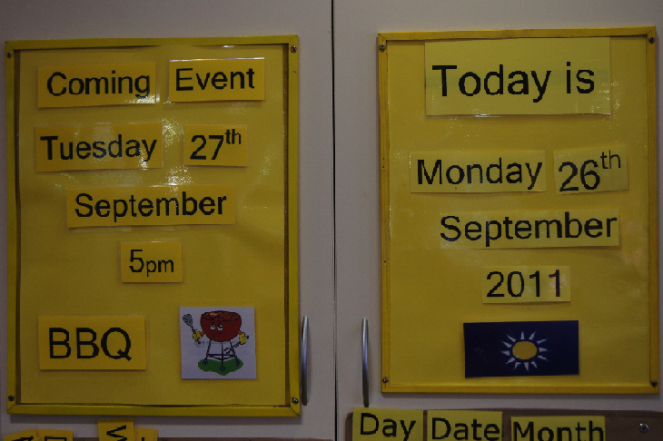
When people cannot retain information internally due to cognitive deficits it becomes important that the information is stored in an external location where the person is able to see it and use it to function to their highest possible level. How can a person living with dementia find the toilet if there are no signs, or know that lunch is at midday or an activity at 1pm. Signage, routines, task breakdown and schedules are very important to people living with dementia. The absence of these things can lead to anxiety, repetitive questions, wandering and other responsive behaviours.
The use of cue cards can stop repetitive questioning, a behaviour that occurs when people are unable to retain the information they need such as ‘What time is lunch?’, ‘What do I do now?’ or, ‘When is my husband visiting?’. Common sense should tell us that the information needs to be available on the spot for the person to access at any time.
In the absence of memory supports staff tend to become frustrated by being asked the same question again and again. They forget that for the person living with dementia it is always the first time that they have asked!
We have known for many years the value of memory books and how they can be used as both reminiscence, life review aids and to enable the person living with dementia to be able to place themselves in time and space. Despite having the evidence to support memory books they are sadly not the norm in most care homes. They should be considered as important as care plans.
The challenges of living with memory problems are immense, the frustration, fear and uncertainty must at times be overwhelming. Whilst there is not a great deal we can do about a person’s level of dementia we can work around the dementia and support memory loss in many ways including those outlined above.
Techniques like Spaced Retrieval can also help some people to learn important pieces of information enhancing self-worth, independence and maintenance of lifestyle. If we worked from the assumption that people with dementia can learn, the only relevant question is what is it you would like them to learn.
A simple learning screening tool identifies those people who are most likely to be able to learn new information through the Spaced Retrieval technique.